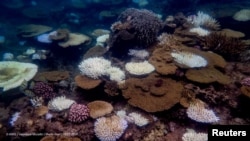Coral reefs around the globe are experiencing a massive bleaching event for the fourth time, turning them ghostly white, the National Oceanic and Atmospheric Administration, or NOAA, said Monday. The bleaching could impact global economies, ecosystems and livelihoods, according to a report from the agency.
Since February 2023, more than 54 countries and territories have experienced significant coral bleaching, and the recently announced global bleaching is the second in 10 years.
The bleaching poses a threat to coral as it occurs when changes in temperature cause coral to expel from their tissues the nutrient-dense algae that sustains them. Many bleaching events, such as this one and the three preceding it, coincide with the El Niño weather pattern, or the warming of the ocean temperatures.
While coral bleaching has become more common, it can only be considered "global" if it occurs in each of Earth's major ocean basins including the Atlantic, Pacific and Indian oceans, in a 365-day period.
Derek Manzello, the coordinator of NOAA's Coral Reef Watch, which monitors heat stress said, "As the world's oceans continue to warm, coral bleaching is becoming more frequent and severe."
According to the Reuters news agency, the global bleaching event could be the worst yet.
"Everything that you can see while diving was white in some reefs," said Lorenzo Alvarez-Filip, a marine ecologist at the National Autonomous University of Mexico.
Alvarez-Filip added that if waters cool, it is possible for bleached corals to recover, but some Caribbean corals reached a point where they died despite temperature drops over the winter.
In the statement, NOAA said, "This global event requires global action," adding that the agency, along with other international stakeholders, are helping to "advance coral interventions and restoration in the face of climate change."
Some information in this report came from Reuters, The Associated Press and Agence France-Presse.












